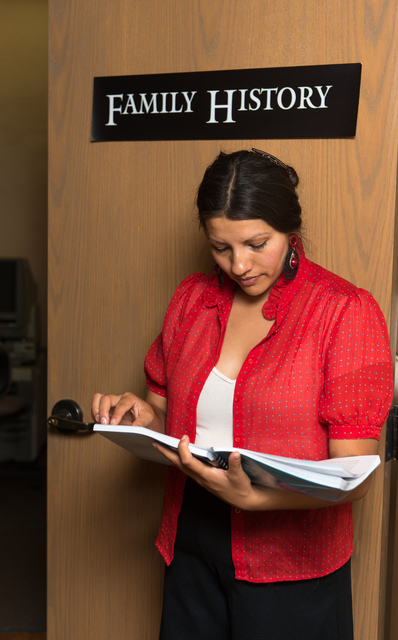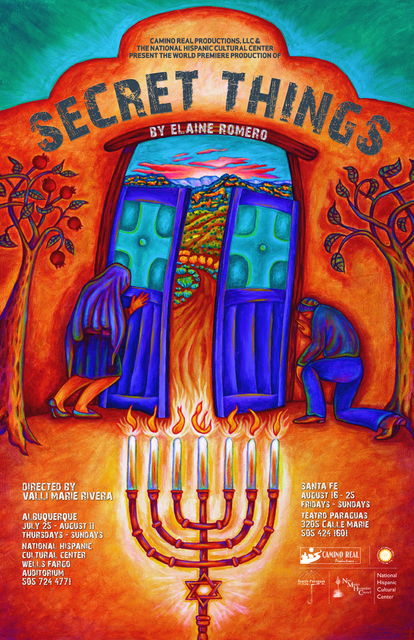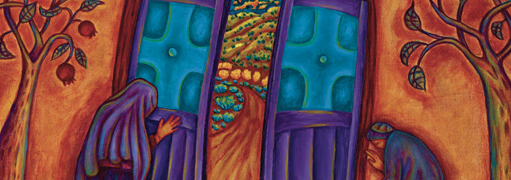Secret Things opens next week, and it might hit close to home for some New Mexicans. A drama about a journalist sent back to her hometown to investigate the possible existence of Crypto-Jews—Mexican-Americans with a Jewish background so guarded that they may not themselves be aware of it—Secret Things will enjoy its world premiere on Thursday, July 25, at the National Hispanic Cultural Center (1701 Fourth Street SW). As she follows leads and digs deeper into the local history, the play’s journalist learns that not only are Crypto-Jews real, but she may be one. At some point, she stops chasing an assignment and begins exploring the roots of her personal identity.To historians, a Crypto-Jew is a descendent of the Sephardic Jews, expelled from Spain and Portugal in the late 15th century, in whom fear of persecution pushed the practices of Judaism so far down that any given individual may be unaware of his own heritage. Estimates vary widely as to how many people were affected, but it is known that those who chose to stay and convert were the reason for the Spanish Inquisition. Conversos were watched closely by the state/church, because they maintained the same communities and were suspected of converting in word but not in deed. Around this same time, those same countries began to set up shop in the so-called New World. Conversos were among the colonizing population and eventually made their way here.To New Mexicans, a Crypto-Jew could mean a family that has never eaten pork, or a tendency toward Israelite names. It might mean a household tradition of wondering if maybe the family was once Jewish. After more than 500 years, it’s easy to lose many of the threads from which a faith was once woven.Elaine Romero is a great example of the modern Crypto-Jew. Growing up, her only connection with Judaism was her mother’s faint suggestion that the family may once have been Jewish. Romero did not grow up in New Mexico, but she says New Mexico is her homeland—that she’s of New Mexico, rather than from here. Perhaps the playwright’s sense of separation is inherent in her disjointed history. In Romero’s short monologue “Mi America está aquí…,” performed by Socorro Sanchez, she sensually explores the pull of homeland, even one known only in tokens.More than a dozen years ago, Romero met a fellow researcher in the Santa Fe Historical Archives. She told him of her mother’s vague notion of converso origin and that she’d always thought about writing a play on the subject. He told her to call him when she did so. Quite by accident, Romero had met Stanley M. Hordes, cofounder of the Society for Crypto-Judaic Studies. The organization is a wellspring of Crypto-Judaic scholarship, news, resources and community. In other words, Romero’s chance meeting with Hordes was as revealing as running into Stephen Hawking just when you’re starting to think very seriously about physics. "He saved me years of research,” Romero says. “I studied everything he told me to study, interviewed people he knew and literally dreamt some dreams that led me into the world of Secret Things. The play could not exist without him."Between Romero’s natural inclination to turn this story into a play and her exposure to the historical roots of Crypto-Judaism, she was well on her way to a stage drama. Other crucial input came from Romero’s physicist brother and another friend, with a major kick from her subconscious.Secret Things began as a typical linear play, but then took the path of the wild hair. Romero’s dreams began to inform her writing, especially one character’s theories of physics. As in dreams, time became fractured in the play, and that’s when it all came together for her. Although the play is fairly synchronous with the playwright’s heritage, she says this play is not about her, that her path is unlike that of main character Delia.First completed in 2000, Secret Things has been workshopped all over the United States, including several staged readings. It’s published in Playscripts, unusual for a play that has not yet premiered. When she wrote this script, Elaine Romero was playwright-in-residence at the Arizona Theater Company, funded by a Pew Charitable Trusts grant. Now based out of Chicago, Romero is working on a trilogy of plays about America at war, along with one play in a commissioned series about great Chicago women. Her subject is social welfare advocate Jane Addams, who in 1931 became the first American woman Nobel Laureate. Romero remains playwright-in-residence for the Arizona Theater Company and teaches, writes and travels in support of her works.At the beginning of the NHCC production process, Romero joined table readings via Skype to discuss interpretive aspects, but mostly left the staging to the theater. Raw and direct feedback is something she is clearly keen on. Surely New Mexico will give Romero a better response than her very earliest script submission: Her cover letter came back from a New York theater with the word "No" scribbled across it in red crayon. This premiere, Romero says, is a moment of truth: when the play goes on in front of the very people it regards.
World Premiere of Secret ThingsThursday, July 25, 7:30 p.m.Runs through August 11Thursdays through Saturdays, 7:30 p.m.Sundays, 2 p.m.National Hispanic Cultural Center1701 Fourth Street SWTickets: $18; $13 for students, seniors and NHCC, ATG and TLC members246-2261, nationalhispaniccenter.org












